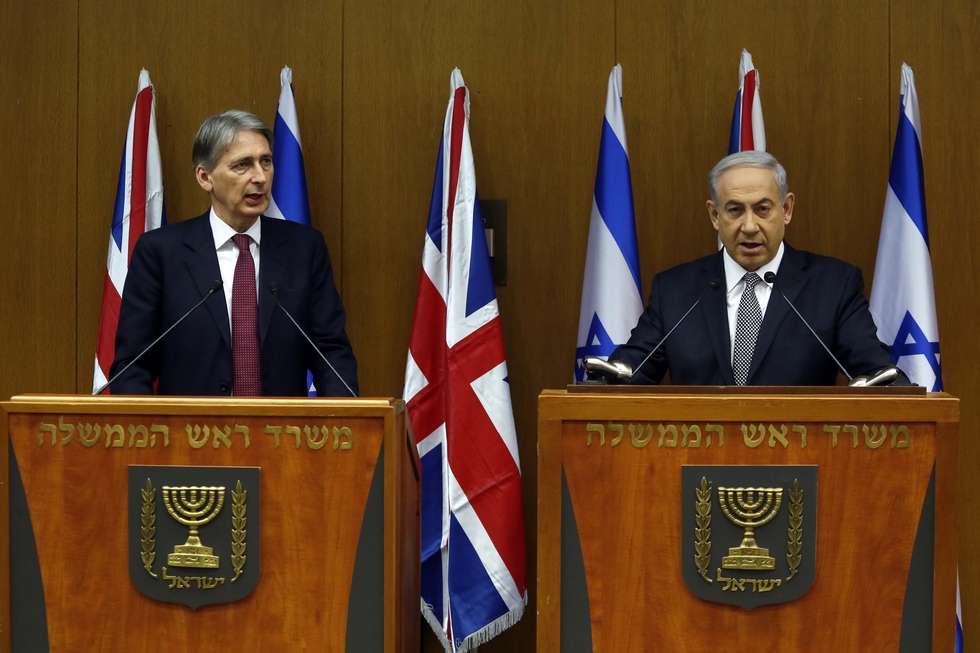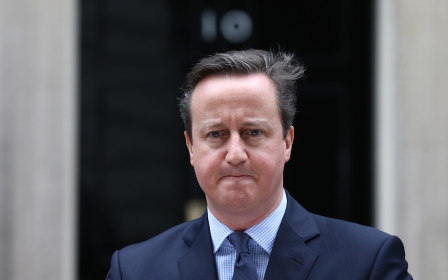UK government lines up with Israeli bullying from UN to the town hall

The Conservative Party is fast cementing the British government’s reputation as one of Israel’s strongest allies, even as Benjamin Netanyahu’s hard-right coalition pursues settlement expansion, land expropriation and nationalist legislation.
While there has long been a disparity between the UK government’s position on international law and action (or lack of it) taken in response to Israeli breaches, under the current government, that gap is only getting wider.
In recent times, the Tories have pursued a foreign policy that opposes modest Palestinian attempts at accountability, and at home they have sought to intimidate and suppress Palestine solidarity activism.
On 24 March, the UK abstained on two resolutions at the United Nations Human Rights Council concerning Palestinian rights. One of the resolutions, on Israel’s illegal settlements in the Occupied Palestinian Territory (OPT), included a paragraph establishing “a database of all business enterprises involved” in settlement activities.
Ahead of the vote, British diplomats joined their Israeli and US counterparts in applying significant diplomatic pressure on the Palestinians to remove this paragraph. Unnamed Palestinian officials said UK officials “warned them” that keeping the paragraph in the draft text “could affect both aid to the Palestinian Authority and bilateral ties”.
But that was not all. When the Palestinians insisted on keeping the paragraph, the UK abstained from a second resolution on accountability and international law in the OPT as a punitive measure.
Labour shadow human rights minister Andy Slaughter described the two abstentions as “depressing and hypocritical,” while Chris Doyle, director of the Council for Arab-British Understanding (CAABU), described events in Geneva as another example of the government’s “self-imposed red line,” whereby “they will not go beyond issuing pro forma condemnations of settlements”.
Yet while threatening Palestinians for modest steps towards accountability for Israeli policies, the British government’s response to Israeli obstructiveness is remarkably weak. Take, for example, Israel’s recent refusal to meet with senior British lawyers tasked with following up on recommendations made in the high-profile 2012 report, “Children in Military Custody”.
According to Military Court Watch, the delegation learned in February “that the Israeli government was unwilling to engage with the lawyers and as a result the … trip has been cancelled". As Under Secretary of State for Foreign and Commonwealth Affairs Tobias Ellwood stated on 6 January, the original delegation and report, and the thwarted follow-up visit, are UK government-funded.
Yet in response to Israel’s refusal to cooperate, Ellwood could only muster a statement of “strong disappointment,” and a declaration of intent to continue “working with Israel to secure improvements to the practices surrounding children in detention in Israel”.
The government’s resolve to shield Israel and its officials has become embarrassing. Last year, for example, wanted war crimes suspect Tzipi Livni was (once again) granted Special Mission immunity by the Foreign Office, despite the fact that the occasion for her visit to the UK was the Fortune Most Powerful Women International Summit.
Attacks on BDS action
The Tories’ desire to protect Israel from accountability has also extended to a domestic attack on Palestine solidarity activism, and in particular, the Boycott, Divestment and Sanctions (BDS) campaign.
In October 2015, the Conservative Party announced in a press release that the government would introduce “new rules to stop politically-motivated boycott and divestment campaigns by town halls against UK defence companies and against Israel”.
The statement was notable for its charged rhetoric, and talking points seemingly copied and pasted from pro-Israel groups: boycotts were described as “threaten[ing] to inflame tensions in local communities, undermining integration and fuelling broader anti-Semitism".
Yet the promised “anti-boycott” laws have failed to materialise. When Cabinet Office Minister Matthew Hancock stood alongside Netanyahu on 17 February to launch “new guidance” to stop “town hall boycotts,” he did not mention that the document simply repeated pre-existing rules that already prohibited discrimination based on national origin in public authority procurement.
In a way, the lack of an actual "ban" on boycotts, as widely and incorrectly reported, is more damning; the government has not changed the law but sought to intimidate local authorities into thinking that it has.
As Labour MP Richard Burden put it, the “danger” is that “Councils and other public sector institutions could be deterred from taking ethical investment and procurement decisions in general” that they are in fact entitled to take.
Meanwhile, we wait for details regarding the government’s planned changes to local authorities’ pension fund regulations. The prospect of councils being blocked from deciding how to invest funds, including “on legitimate ethical grounds,” has been described as “completely anti-democratic” by charity War on Want and was opposed by 26,000 people during a public consultation period.
Gove's phantom legal changes
On 15 March, Justice Secretary Michael Gove spoke at a conference on anti-semitism in Berlin. During a section dedicated to attacking the BDS campaign, Gove boasted of “legal changes we have made”, saying that the government had “outlaw[ed] prejudice paid for by public money”.
When I asked the Ministry of Justice what exact “legal changes” Gove was referring to, a spokesperson pointed me to the aforementioned procurement guidance issued in February.
I pointed out that a policy note cannot be used to change the law, and that, in addition, the document in question merely stated “existing policy that has been in place for many years” (in the words of the Parliamentary Secretary for the Cabinet Office).
Both of these observations were confirmed on the phone by a ministry spokesperson – but subsequent attempts to seek clarification about what Gove meant by “legal changes” met a dead end. Even a Parliamentary question on the matter produced a non-answer.
In other words, the Justice Minister did not tell the truth, in ignorance or intentionally. Either Gove himself is confused by the government’s own spin, or, he sought to impress his audience – which included Israeli officials – with a commitment to undermine Palestine solidarity activism that is, for now, not actually matched by legislative changes.
Earlier this week, Parliament’s Foreign Affairs Committee warned of a “clear perception that the human rights work of the Foreign and Commonwealth Office has been deprioritised.” Responding to the committee’s report, The Guardian asked whether there is “more to David Cameron’s foreign policy than trying to sell more stuff to foreigners”.
The paper described the UK’s “often cynical relationships with countries including China, Russia, Egypt and Saudi Arabia,” a list where Israel firmly belongs.
Whether the motivations are economic, ideological or party political (or a combination of all three), the Conservatives’ determination to prevent Israel being held to account are making a mockery of the UK’s supposed support for human rights abroad, and undermining democracy at home.
- Ben White is the author of Israeli Apartheid: A Beginner’s Guide and Palestinians in Israel: Segregation, Discrimination and Democracy. He is a writer for Middle East Monitor, and his articles have been published by Al Jazeera, al-Araby, Huffington Post, The Electronic Intifada, The Guardian’s Comment is free, and more.
The views expressed in this article belong to the author and do not necessarily reflect the editorial policy of Middle East Eye.
Image: British Foreign Secretary Philip Hammond and Israeli Prime Minister Benjamin Netanyahu speak during a joint press conference on 24 July 2014 at the Knesset in Jerusalem, during the Israeli Protective Edge assault on Gaza.
New MEE newsletter: Jerusalem Dispatch
Sign up to get the latest insights and analysis on Israel-Palestine, alongside Turkey Unpacked and other MEE newsletters
Middle East Eye delivers independent and unrivalled coverage and analysis of the Middle East, North Africa and beyond. To learn more about republishing this content and the associated fees, please fill out this form. More about MEE can be found here.





